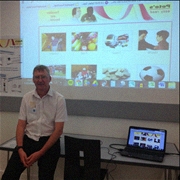Tutor HuntResources Special Needs Resources
Eliciting Web Site Preferences Of People With Learning Disabilities
Date : 30/10/2015
Author Information

Uploaded by : Peter
Uploaded on : 30/10/2015
Subject : Special Needs
Abstract A growing body of literature is recognising the value of the World Wide Web as a tool that can be used to help people with learning disabilities access relevant and appropriately written and presented information. However, little has been written about how to ascertain and facilitate web design and content preferences for this cohort. This paper examines the website preferences of people with learning disabilities and the methodological difficulties in eliciting preferences from this cohort. Participants were presented with three web sites dealing with employment information which they were asked to browse and carry out a series of set-tasks. In order to ascertain preferences, participants were interviewed and also given first a three and then four point rating scale. The problem of acquiescence bias, the tendency for people to automatically agree with those in perceived positions of power or authority, was minimised by the avoidance of 'polar interrogatives' (asking questions requiring a 'yes/no' or similarly polarised answer).
Participants emphasised their liking for the use of pictures, especially as they were taken by and also featured other young people with learning disabilities. Unsurprisingly, the more abstract content related to money or benefits went unnoticed or was not enjoyed. Audio was appreciated where offered, although not extensively used. Text size was an issue too, with reports of the text being too small, although the quantity of text seemed to be the main concern. Regarding menu positioning, the horizontal arrangement was greatly preferred to the vertical one, and the unusual circular menu structure of one of the sites was greatly appreciated. Results are compared to other relevant literature and recommendations formulated to help web developers and information providers. The methodological issues inherent in this study were the use of the rating system, which was modified after the first round of the study, and the interview technique, which included avoiding yes/no questions ('polar interrogatives') in order to minimise 'acquiescence bias'. The study concludes that it is possible to elicit considerable information from people who find it difficult to articulate their views.
This resource was uploaded by: Peter
Other articles by this author
- Web page design and people with learning disabilities
- Optimising website designs for people with learning disabilities
- Web site usability involving people with learning disabilities using only images and audio to
- Using electronic media for the teaching of basic skills at university
